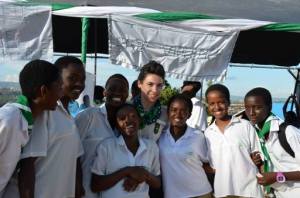
Girl Scouts Nation’s Capital Volunteer Alice Hahn visits WAGGGS seminar in Rwanda for their Stop the Violence Campaign.
Guest Blog by Alice Hahn, Volunteer with Girl Scouts of the Nation’s Capital
Earlier this year I attended a fascinating and rewarding World Association of Girl Guides and Girl Scouts (WAGGGS) training seminar in Rwanda for their Stop the Violence campaign, the only global campaign focused on ending gender-based violence specifically against girls under 18. Since Diane wrote such a comprehensive account of our trip, I’ll focus on the event that left the biggest impression on me.
Mid-way through the week, we began the day bright and early. In equatorial Rwanda, being dressed, fed and on the bus by 6:45am means you’re up before the sun, even in spring. Leaving Kigali, the capital, we bumped and wove down red dirt roads, over hills and through the jungle. After about three hours we arrived at a village in Rukira, in eastern Rwanda near the Tanzanian border.
Our delegation of international Girl Guides and Girl Scouts spilled out of the muddy passenger vans and was immediately greeted with songs and dances by local Girl Guides, thrilled to share their own work against gender-based violence. We gathered in a large clearing in the village where two tents shaded seats for the Rukira Guides, Rwandan planning committee and international WAGGGS delegates. While we listened to local Guides share their personal experiences as survivors of gender-based violence, a crowd gathered. Of course, fifty visitors from around the world—representing every WAGGGS global region—attracted a lot of attention in this remote village. We heard from many speakers: local community leaders and politicians spoke, and the Rukira Guides explained their counseling center for survivors of gender-based violence. All the while, new faces piled into our gathering.
To our encouragement, what began as a few passers by steadily grew into a crowd of several hundred attentive locals surrounding our tents. At the school break, instead of going home for lunch, the schoolchildren flocked to our assembly, too. What started as a gathering of international sisterhood and sharing among allies grew into more than any of us could have hoped. Much of the program was in Kinyarwanda and French, and the translation wasn’t projected loud enough for the WAGGGS delegates to hear. But the locals heard it all. They saw the giant sign that commanded Stop the Violence. They heard their community leaders professing that violence against women and girls is unacceptable. They learned about the medical and psychological resources the Rukira Girl Guides offered to survivors of violence. Not least, they saw the global community of Girl Guides and Girl Scout unite behind their local Guides.
Throughout the week as we shared the status of gender-based violence in our own countries, one thing all of the WAGGGS delegates agreed on was that a significant step toward ending such violence is to start the conversation. Around the world, gender-based violence persists in part because many people refuse to admit or acknowledge that it is a problem or that it happens in their own communities. Whatever form it takes—early sexualization, date rape, domestic violence, female genital mutilation, child marriage—it happens in every community and every country. We can begin to eradicate it when we start the conversation, building from a whisper to a shout.
Everyone needs to learn about the very real problem of violence against girls: not just girls and parents, but community leaders and politicians, men and boys. The Girl Guides of Rukira are doing their part by raising awareness at a local level. By spreading the message beyond existing allies—to people who don’t realize the severity of the problem—we can gain new allies and make greater strides toward a world where girls are safe from all forms of violence.
